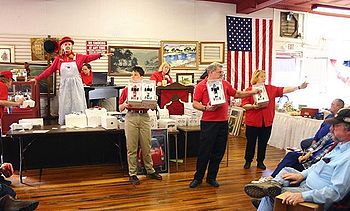Portal:Business
The Business and Economics Portal Business is the practice of making one's living or making money by producing or buying and selling products (such as goods and services). It is also "any activity or enterprise entered into for profit." A business entity is not necessarily separate from the owner and the creditors can hold the owner liable for debts the business has acquired. The taxation system for businesses is different from that of the corporates. A business structure does not allow for corporate tax rates. The proprietor is personally taxed on all income from the business. A distinction is made in law and public offices between the term business and a company such as a corporation or cooperative. Colloquially, the terms are used interchangeably. (Full article...) Economics (/ˌɛkəˈnɒmɪks, ˌiːkə-/) is a social science that studies the production, distribution, and consumption of goods and services. Economics focuses on the behaviour and interactions of economic agents and how economies work. Microeconomics analyses what is viewed as basic elements in the economy, including individual agents and markets, their interactions, and the outcomes of interactions. Individual agents may include, for example, households, firms, buyers, and sellers. Macroeconomics analyses the economy as a system where production, distribution, consumption, savings, and investment expenditure interact, and factors affecting it: factors of production, such as labour, capital, land, and enterprise, inflation, economic growth, and public policies that have impact on these elements. (Full article...) Selected articleThe economy of the Iroquois (also known as Haudenosaunee) historically was based on communal production and combined elements of both horticulture and hunter-gatherer systems. The tribes of the Iroquois Confederacy and other Northern Iroquoian-speaking peoples, including the Huron, had their traditional territory in what is now New York State and the southern areas bordering the Great Lakes. The Iroquois peoples were predominantly agricultural, harvesting the "Three Sisters" commonly grown by Native American groups: maize, beans, and squash. They developed certain cultural customs. Among these developments were ideas concerning the nature and management of property. The Iroquois developed a system very different from the now-dominant Western variety. This system was characterized by such components as common ownership of land, division of labor by gender, and trade mostly based on gift economy. Selected image
Selected economyThe economy of Brazil is historically the largest in Latin America and the Southern Hemisphere in nominal terms. The Brazilian economy is the second largest in the Americas. It is an upper-middle income developing mixed economy. In 2024, according to International Monetary Fund (IMF), Brazil has the 8th largest gross domestic product (GDP) in the world and has the 8th largest purchasing power parity in the world. In 2024, according to Forbes, Brazil was the 7th largest country in the world by number of billionaires. According to International Monetary Fund (IMF), Brazilian nominal GDP was US$2.331 trillion, the country has a long history of being among the largest economies in the world and the GDP per capita was US$11,178 per inhabitant. The country is rich in natural resources. From 2000 to 2012, Brazil was one of the fastest-growing major economies in the world, with an average annual GDP growth rate of over 5%. Its GDP surpassed that of the United Kingdom in 2012, temporarily making Brazil the world's sixth-largest economy. However, Brazil's economic growth decelerated in 2013 and the country entered a recession in 2014. The economy started to recover in 2017, with a 1% growth in the first quarter, followed by a 0.3% growth in second quarter compared to the same period of the previous year. It officially exited the recession. (Full article...) Selected quote"From the supermarket we got the idea of viewing the earlier process in a production line as a kind of store. The later process (customer) goes to the earlier process (supermarket) to acquire the required parts (commodities) at the time and in the quantity needed. The earlier process immediately produces the quantity just taken (restocking the shelves). We hoped that this would help us approach our just-in-time goal and, in 1953, we actually applied the system in our machine shop at the main plant. In the 1950s, American-style supermarkets appeared in Japan, bringing the object of our research even closer. And when in America in 1956, I finally fulfilled my desire to visit a supermarket firsthand."
TopicsRelated WikiProjectsDid you know (auto-generated) -
On this day in business history
General imagesThe following are images from various business-related articles on Wikipedia.
More did you know
Business news Wikinews Economy and business portal
|








































